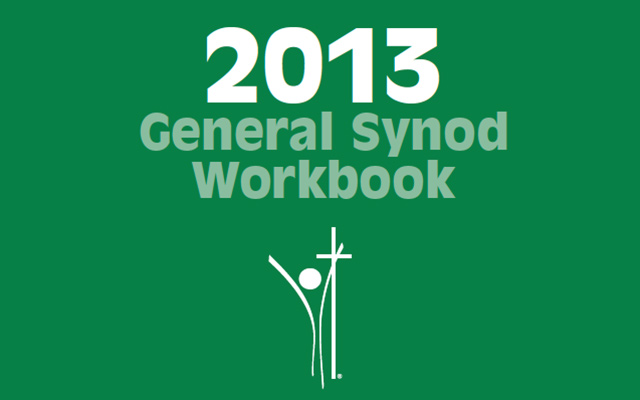The question—can churches split?—reminds me of the bromide attributed to Samuel Clemens.
Do you believe in infant baptism?
Believe in it? Hell, I’ve seen it!
The General Synod of my church—the Reformed Church in America—begins the day after tomorrow, Thursday, here in my town of Pella, Iowa. General Synod is the widest decision-making body of our church; the annual conclave of ministers, elders, and sundry other staff, groupies and hangers-on. Synod is part fa mily reunion, part business meeting, and part promotional bonanza.
mily reunion, part business meeting, and part promotional bonanza.
One of the more intriguing, perhaps controversial, items that will come before this year’s RCA General Synod is known as “R-16” (“R” for recommendation).
On the hottest, most divisive issues in the church, rarely do we really debate the issue itself. Instead, it becomes a matter of “polity” (how we structure ourselves). Are we true to our Constitution? Are we following our order? And on the issues surrounding LGBT inclusion in the church, it is happening again. I’m not quite sure what to think of this. Is this the church’s way of lawyering up? Or are we simply trying to fight fair?
Here’s the back story. Last year’s Synod reaffirmed the long-held RCA position that homosexual behavior is sin. Whatever you happen to think about that position, it isn’t really new or surprising for the RCA. But General Synod statements are hardly towering or binding pronouncements. Don’t be thinking Protestant versions of papal encyclicals. Past General Synods have made statements about Styrofoam cups and gun control which no one seems to notice, let alone revere.
What was new last year was Synod’s assertion that advocating for LGBT inclusion or presiding at a gay wedding were “disciplinable offenses.” You could get in trouble for them. In other words, General Synod was telling local bodies who they should discipline and for what. This seemed to many like a provocative overreach of General Synod power, a radical breach in our polity.
So this year’s “R-16” comes to Synod as the recommendation from the “Way Forward” task force, appointed in light of last year’s rancor. After proposing a “grace-filled conversation” about the reach and extent of a General Synod’s authority, and the possible profound changes in the way we do church together, the recommendation ends with an escape-hatch. If the grace-filled conversation does not reach consensus, then congregations and ministers could chose to leave via a “grace-filled and accountable separation from membership within the Reformed Church in America without recriminations such as forfeiture of property.” All sorts of images come to mind—amicable divorce; prearranged funeral plans so the kids don’t have to deal with the mess and expense.
Are you still with me? If so, then you realize this is a pretty incredible proposal. Basically a church is saying that if we can’t find agreement on a way forward, then we can go our own way. Take your marbles and go home. The first time I read R-16, I thought it was facetious.
Al Janssen, a RCA minister and “General Synod Professor of Theology”—about whom it is true that he has forgotten more about Reformed polity, theology, and history than most of us will ever know—has written a blog subtly titled Why R-16 is a Spectacularly Bad Idea. Among other things, Janssen posits that churches just don’t split. By definition, it is contrary to our very nature—one, holy, catholic and apostolic. “It is incoherent for Reformed folk to propose disunity,” says Janssen.
In a deliciously ironic twist, Janssen reminds us that “unity” is one of the main points of the RCA’s recently adopted doctrinal standard, the Belhar Confession. Just three years after boldly declaring that “unity is both a gift and an obligation for the church of Jesus Christ” and “accordingly that anything which threatens this unity may have no place in the church and must be resisted,” the RCA is now proposing “grace-filled separation”? According to Janssen, churches split only when apostasy is the issue. When you split a church, you yell “You Christ-denying heretic!” not “Blessings as you find your grace-filled way forward.”
My brief response is posted below Al’s blog. Basically I wonder if different churches, denominations, and splits might not be more like families than a deep affront to the Gospel. I recognize your family as good and decent folk, but I don’t want to move in or celebrate holidays with you. Similarly, I can like Methodists and Baptists and people who disagree with me about LBGT matters. I recognize them as brothers and sisters in Christ, part of the same one, holy, catholic, and apostolic Church. But I may not really want to have formal ties with them, share General Synod with them, and continually bang heads with them. And they likely say to me, “Right back at you!”
Or might we look at church splits the way we look at war, divorce, and other ethical accommodations? Tragic and unfortunate, but maybe a necessary “way forward” fraught with collateral damage. I’ve often quipped that all the broadly Reformed bodies—from the United Church of Christ to United Reformed or Orthodox Presbyterians—should release all congregations to realign and re-sort themselves into three different piles. Like Goldilocks, every congregation would select between too hard, too soft, and just right. Pick one. No oxymoronic “independent Reformed” churches. Of course, no one is delusional enough to think these new arrangements and bodies would be harmonious and unified, but it’s a fun exercise to while away the hours!
Instead of being facetious, maybe R-16 is more like the mature parent saying to the petulant child, “Is this really what you want?” R-16 invites us to walk to the edge of the cliff as a church and carefully deliberate, do we want to jump? We might wonder if a recommendation to General Synod is the place to do psychotherapy on the church via semi-serious proposals that stand almost no chance of ever happening. But maybe after watching the Episcopalians, Lutherans, and Presbyterians tear themselves apart, perhaps R-16 is an earnest attempt to truly look for a “grace-filled” alternative.

